Wu Tsai-li is all business as he leans over a pile of human bones that he’s just dumped on top of a grave, and begins to arrange them back into a vaguely skeletal form.
Wu is in the process of performing a rite of ancestor worship called “picking up the bones.” A part of a ritual generally known as double or second burial, the bones are placed in an urn with the skull at the top. The urn is then re-interred in the ancestral tomb.
Common in Taiwan for over two centuries, the custom has its origins in China’s Fujian Province. When farmers and merchants began migrating to Taiwan in the 17th century, they brought with them their custom of second burial. Over time, the tradition began to spread in Taiwan as it was an inexpensive way of sending the bones back to Fujian for burial in the ancestral tomb.
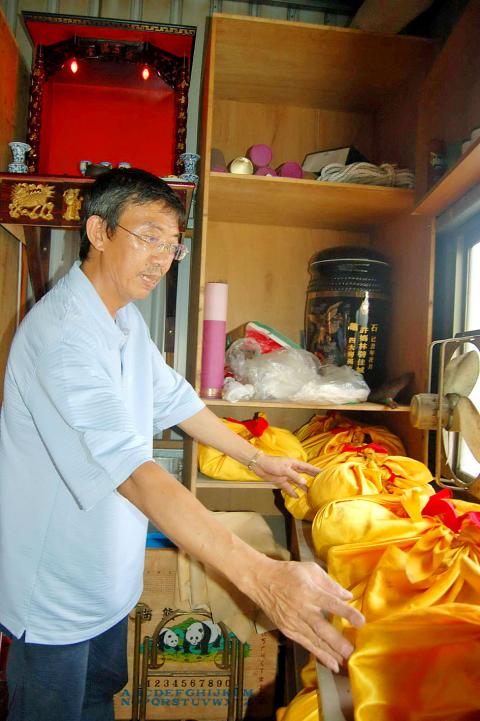
Photo: Liu Hsiao-hsin, Liberty Times
照片︰自由時報記者劉曉欣
However, as their roots sank deeper into the nation’s soil and people from Fujian began to regard Taiwan as their home, the process of returning the urns to China ceased as family plots were established in Taiwan.
The process, which has changed very little over the centuries, begins with the first burial taking place almost immediately after death. Regarded as a temporary grave, the body remains underground for at least seven years.
The length of time allows the flesh to decompose, making it easier for Wu, a “bone-picking” master, to clean the remaining flesh so that all that is left are the bones. After the flesh is removed, the bones are set out under the sun for three days to dry. They are then “picked up” and placed into the urn, and returned to the family gravesite.
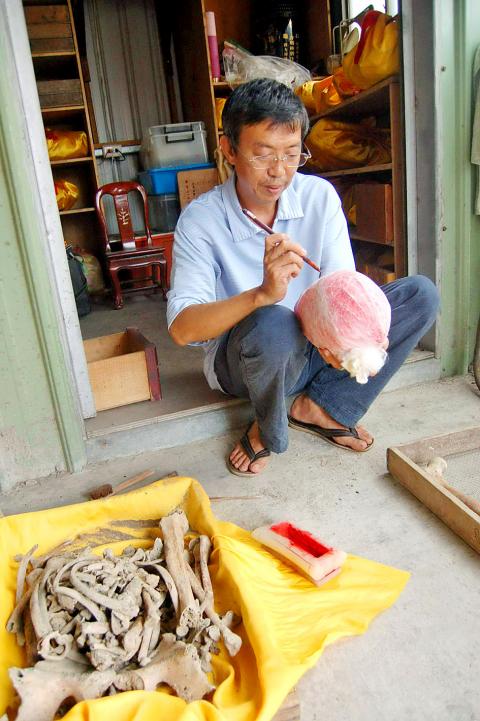
Photo: Liu Hsiao-hsin, Liberty Times
照片︰自由時報記者劉曉欣
If it happens that the flesh hasn’t achieved a level of decomposition suitable for cleaning, Wu sprinkles rice wine over the corpse and dresses it with the leaves of six heads of cabbage. The body is then re-interred. The concoction is enough to ensure sufficient decomposition after an additional three months.
The reason for such an elaborate procedure, Wu says, is that the soul adheres to the bones and not the flesh. This is why the flesh is dispensed with and the bones are re-buried after cleaning.
(Noah Buchan, Taipei Times)
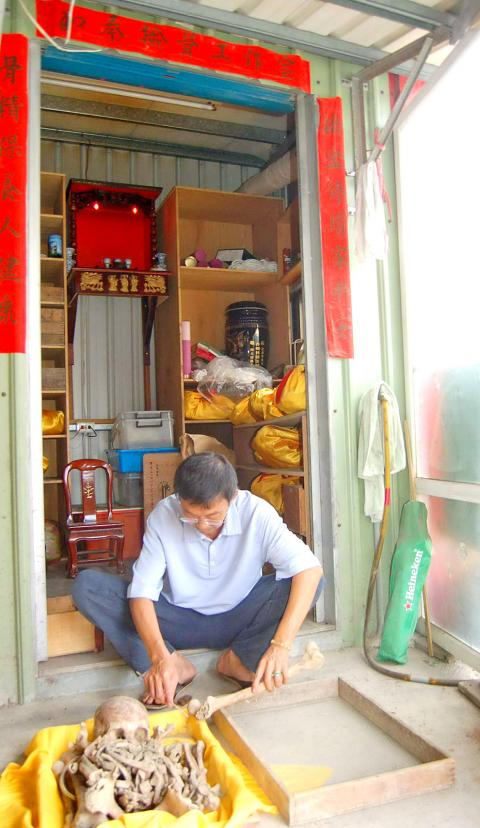
Photo: Liu Hsiao-hsin, Liberty Times
照片︰自由時報記者劉曉欣
吳財立莊重肅穆地俯身向前,面朝著他剛剛倒在墓地上的一堆人骨,開始進行整理,重新排列成一組模糊的骨骸。
吳財立正在進行祭拜祖先的一項儀式,稱為「揀骨」。在這項通常又稱「二次葬」的儀式中,祖先遺骨會被安放在金斗甕中,頭骨放在最上方,再將金斗甕重新葬入祖墳中。
超過兩世紀以來,在台灣廣泛可見的這項習俗,源自於中國的福建省。隨著當地農民與商賈人士在十八世紀移居台灣,他們將「二次葬」的習俗也帶了過來。時光荏苒,這項傳統逐漸盛行於台灣各地。主要的原因在於,當時的先人如果想將祖先遺骨送回福建,葬入祖墳,這種方式並不算昂貴。
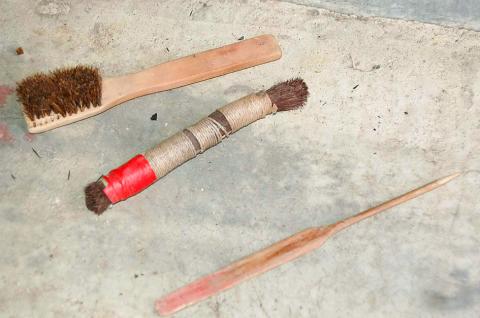
Photo: Liu Hsiao-hsin, Liberty Times
照片︰自由時報記者劉曉欣
不過,隨著先人逐漸深入扎根於台灣的土地,來自福建的移民也開始視台灣為家鄉,將金斗甕送回中國的習俗遂逐漸式微,人們也在台灣建起自己家的祖墳。
幾世紀以來,撿骨儀式的過程並沒有太大的改變。首先是一次葬,幾乎在過世後馬上開始進行。接下來遺體會在地下待上起碼七年,這段時間的墳墓則被視為暫時性的。
時間的長度會讓肉體逐漸分解,也使撿骨師傅吳先生更容易清理殘留的身體組織,最後只留下骨頭。徹底清除餘肉後,再將骨頭鋪在太陽底下曝曬三天,進行乾燥,接著便是「撿骨」,放入金斗甕,再重新葬回家族墓園。
萬一發生肉體還未達到適合清理的腐化程度時,吳師傅會在屍身上灑下米酒,再用六顆高麗菜裹住,再度葬回土中。米酒和高麗菜混合的成份足以確保腐化效率,再等三個月後就能重新撿骨。
根據吳師傅的說法,如此複雜的程序,背後原因在於靈魂附著於骨骸而非肉體上。這也就是為什麼肉體最後會被捨去,而骨骸則會在清理後重新下葬。
(台北時報章厚明譯)
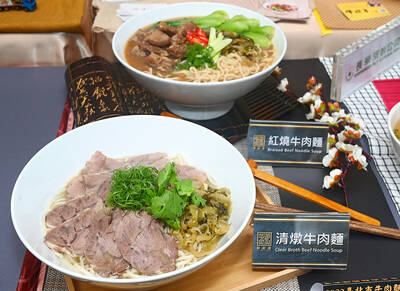
A: In its latest annual travel guide, Bloomberg recommended two restaurants in Taipei: Golden Pig barbeque from South Korea and two-Michelin-star restaurant A. B: Also, tourists should definitely try Taiwanese cuisine while they’re here. Mountain & Sea House, Shin Yeh Taiwanese Cuisine, and Fujin Tree Taiwanese Cuisine & Champagne are good options. A: For local snacks, Fu Hang Soy Milk, Fu-Ba-Wang Pigs’ Knuckles Restaurant, and Wang Ji Rice Dumplings are all very popular. B: And the gold medalists of the 2025 Taipei International Beef Noodle Festival — Yun Shui Kitchen, The Howard Plaza Hotel Taipei, and Come N’ Eat
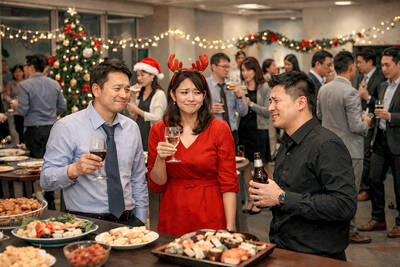
For many introverts, shy individuals and people with social anxiety, mingling at parties is often draining or arouses uncomfortable emotions. The internal debate about whether or not to attend large get-togethers can get especially intense during the holiday season, a time when many workplaces celebrate with cocktail hours, gift exchanges and other forms of organized fun. “Some people are just not party people,” City University of New York social work professor Laura MacLeod said. “With a workplace holiday party, there’s a pressure to be very happy and excited. It’s the end of the year, it’s the holidays, we’re all feeling grand.
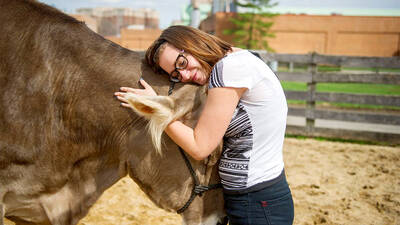
Facing relentless flooding and rising expenses, Dumble Farm in England has stopped selling milk and started an unexpected but therapeutic venture: cow cuddles. In 2022, the owners sold most of their dairy cows and began letting visitors spend time brushing, petting, and even hugging specially trained Highland cows for 95 pounds per session. This unusual shift reflects the rise of the so-called healing economy, a sector where animal-assisted experiences are marketed as emotional remedies for stress and burnout. While dogs and cats remain the most common therapy animals, cows are gaining popularity for their calm nature. At Dumble Farm, only cows that
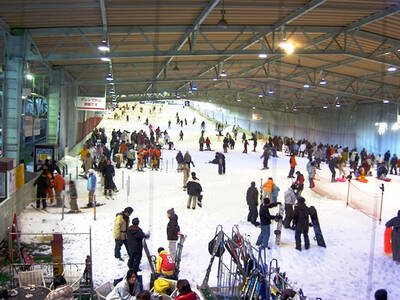
對話 Dialogue 清清:你看到小陳最近發的滑雪照了嗎?看起來真帥氣。 Qīngqing: Nǐ kàndào Xiǎo Chén zuìjìn fā de huáxuě zhào le ma? Kàn qǐlái zhēn shuàiqì. 華華:感覺滑雪很好玩。看了他的照片以後,我在想要不要去學滑雪。 Huáhua: Gǎnjué huáxuě hěn hǎowán. Kàn le tā de zhàopiàn yǐhòu, wǒ zài xiǎng yào bú yào qù xué huáxuě. 清清:我聽說報名滑雪教室的話,會有教練帶你練習。 Qīngqing: Wǒ tīngshuō bàomíng huáxuě jiàoshì de huà, huì yǒu jiàoliàn dài nǐ liànxí. 華華:可是我有點怕摔倒,而且裝備好像不便宜。 Huáhua: Kěshì wǒ yǒudiǎn pà shuāidǎo, érqiě huāngbèi hǎoxiàng bù piányí. 清清:剛開始一定會摔啊,不過可以先上初級課程,比較安全。 Qīngqing: Gāng kāishǐ yídìng huì shuāi a, búguò kěyǐ xiān shàng chūjí kèchéng, bǐjiào ānquán. 華華:說的也是。那你呢?你想不想一起去? Huáhua: Shuō de yěshì. Nà nǐ ne? Nǐ xiǎng bù xiǎng yìqǐ qù? 清清:我想加一!我們可以先找找看哪裡有教練和適合初學者的課程。 Qīngqing: Wǒ xiǎng jiā yī! Wǒmen kěyǐ xiān zhǎo zhǎo kàn nǎlǐ yǒu jiàoliàn hàn shìhé